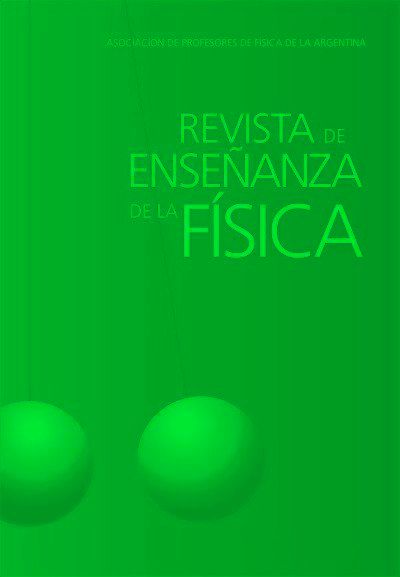Refining Archimedes' principle through classroom experimentation, an analysis from discourse progressiveness
DOI:
https://doi.org/10.55767/2451.6007.v33.n2.35178Keywords:
Experiment, Discourse progressiveness, Real classroomAbstract
A case study of a real class is presented during which students analyze the situation of a container of water, located on the pan of a
balance. They are asked if (and how) the scale reading will be altered by placing a floating wooden body in the water. The research
question is what role the experiment occupies in the social mechanism of progressivity. The analysis shows that the experiment can
strongly influence the discursive dynamics in the classroom. In the case analyzed, it operates as an element that fixes a part of the
semantic structure. The study enriches the understanding of interactions in the classroom and how they could be fostered; at the same
time, it provides information about how to generate the conditions for an experiment to be relevant from the point of view of learning
concepts and can be interpreted in depth by students.
References
Abrahams, I., Millar, R. (2008). Does practical work really work? A study of the effectiveness of practical work as a teaching and learning method in school science. International journal of science education, 30(14), 1945-1969.
Baudino Quiroga, N., Coleoni, E. A. (2020). Understanding improved interactions in a Physics classroom through the lens of discourse progressiveness. International Journal of Science Education, 42(16), 2696-2715.
Bereiter, C. (1994). Implications of postmodernism for science, or, science as progressive discourse. Educational psycholo-gist, 29(1), 3-12.
Clarà, M. (2019). Building on each other’s ideas: A social mechanism of progressiveness in whole-class collective inquiry. Journal of the Learning Sciences, 28(3), 302-336.
Coştu, B., Ayas, A., Niaz, M. (2012). Investigating the effectiveness of a POE-based teaching activity on students’ under-standing of condensation. Instructional Science, 40(1), 47-67.
Cutrera, G., Massa, M. B., Stipcich, M. S. (2020). Interacciones discursivas en el trabajo didáctico con explicaciones. Un estudio de caso centrado en la estructura de las explicaciones científicas escolares. Revista de enseñanza de la física, 32(2), 19-29.
Furci, V., González, A., Trinidad, O., Peretti, L. (2020). Análisis discursivo de la potencialidad didáctica de una propuesta CTIM. Revista de enseñanza de la física, 32(2), 43-55.
Hart, C., Mulhall, P., Berry, A., Loughran, J., Gunstone, R. (2000). What is the purpose of this experiment? Or can students learn something from doing experiments? Journal of Research in Science Teaching: The Official Journal of the National Association for Research in Science Teaching, 37(7), 655-675.
Katchevich, D., Hofstein, A., Mamlok-Naaman, R. (2013). Argumentation in the chemistry laboratory: Inquiry and con-firmatory experiments. Research in science education, 43(1), 317-345.
Liew, C. W., Treagust, D. F. (1998). The effectiveness of predict-observe-explain tasks in diagnosing students' understand-ing of science and in identifying their levels of achievement.
Downloads
Published
Issue
Section
License
Copyright (c) 2021 Nicolás Baudino Quiroga, Enrique A. Coleoni

This work is licensed under a Creative Commons Attribution-NonCommercial-NoDerivatives 4.0 International License.
Aquellos autores/as que tengan publicaciones con esta revista, aceptan los términos siguientes:Los autores/as conservarán sus derechos de copiar y redistribuir el material, bajo los términos estipulados en la Licencia de reconocimiento, no comercial, sin obras derivadas de Creative Commons que permite a terceros compartir la obra bajo las siguientes condiciones:
- Reconocimiento — Debe reconocer adecuadamente la autoría, proporcionar un enlace a la licencia e indicar si se han realizado cambios. Puede hacerlo de cualquier manera razonable, pero no de una manera que sugiera que tiene el apoyo del licenciador o lo recibe por el uso que hace.
- NoComercial — No puede utilizar el material para una finalidad comercial.
- SinObraDerivada — Si remezcla, transforma o crea a partir del material, no puede difundir el material modificado.
- Los autores/as podrán adoptar otros acuerdos de licencia no exclusiva de distribución de la versión de la obra publicada (p. ej.: depositarla en un archivo telemático institucional o publicarla en un volumen monográfico) siempre que se indique la publicación inicial en esta revista.
- Se permite y recomienda a los autores/as difundir su obra a través de Internet (p. ej.: en archivos telemáticos institucionales o en su página web) antes y durante el proceso de envío, lo cual puede producir intercambios interesantes y aumentar las citas de la obra publicada. (Véase El efecto del acceso abierto).










